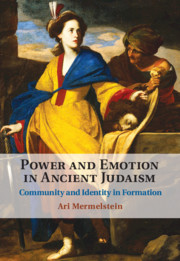Book contents
- Power and Emotion in Ancient Judaism
- Power and Emotion in Ancient Judaism
- Copyright page
- Dedication
- Contents
- Acknowledgments
- Abbreviations
- Introduction Power and Emotion in Ancient Judaism
- Part I Jewish Emotional Resistance to Gentile Power-Over in the Greco-Roman Diaspora
- Part II Jewish Emotion Discourse in Response to Divine Power-Over
- Part III The Dead Sea Sect As Emotional Community
- 6 Feeling Rules in the Construction of Communal Identity
- 7 The Power of Fear
- 8 Sectarian Ritual and the Cultivation of an Emotional Habitus
- Conclusion
- Bibliography
- Primary Source Index
- Modern Author Index
- Subject Index
7 - The Power of Fear
Strategic Manipulation of Fear in the Construction of a Sectarian Emotional Community
from Part III - The Dead Sea Sect As Emotional Community
Published online by Cambridge University Press: 04 June 2021
- Power and Emotion in Ancient Judaism
- Power and Emotion in Ancient Judaism
- Copyright page
- Dedication
- Contents
- Acknowledgments
- Abbreviations
- Introduction Power and Emotion in Ancient Judaism
- Part I Jewish Emotional Resistance to Gentile Power-Over in the Greco-Roman Diaspora
- Part II Jewish Emotion Discourse in Response to Divine Power-Over
- Part III The Dead Sea Sect As Emotional Community
- 6 Feeling Rules in the Construction of Communal Identity
- 7 The Power of Fear
- 8 Sectarian Ritual and the Cultivation of an Emotional Habitus
- Conclusion
- Bibliography
- Primary Source Index
- Modern Author Index
- Subject Index
Summary
Just as shame and disgust, joy and gratitude, and love and hate function centrally in the Hodayot to demarcate emotional communities, fear serves a complex set of purposes in drawing communal boundaries. Fear is perhaps the prototypical emotion of the powerless, arising out of the “structural conditions of insufficient power … or … the excess of the other’s power.” For those reasons, fear is also a useful emotion for communities to instill in their constituencies. Emphasizing the presence and relevance of fear is a way of compelling community members to commit themselves to the collective as the source for overcoming fear; Max Weber noted that “obedience is determined by highly robust motives of fear and hope.” Fear enables communities to draw boundaries by marking themselves off from the source of fear. A group such as the Yaḥad, which sought to create an insular life for itself, had good reason to cultivate fear in its members. In this chapter, I consider the political dimension of fear: the relationship between power and emotion in inter-group conflict and the manipulation of the discourse of fear by group leaders. In focusing on the Yaḥad and the role of fear in the sect’s emotionology, I pose the following question: Did a group with unshakeable faith that their cause was backed by divine power have any reason to fear, and, if so, how did the group manage that fear? As we will see, various sectarian texts, composed at different times and with disparate sources of fear in mind, answered this question differently.
- Type
- Chapter
- Information
- Power and Emotion in Ancient JudaismCommunity and Identity in Formation, pp. 183 - 220Publisher: Cambridge University PressPrint publication year: 2021



